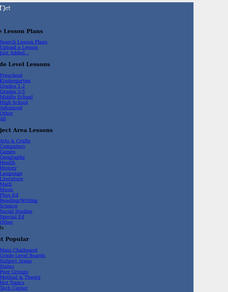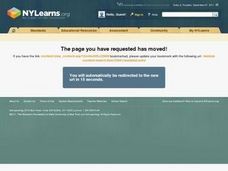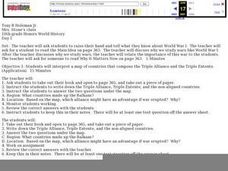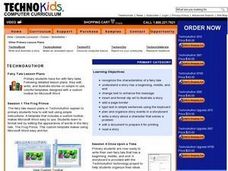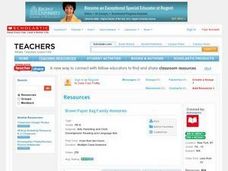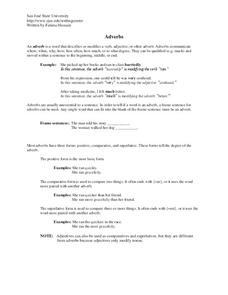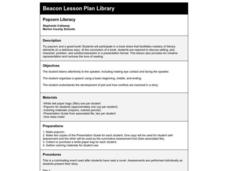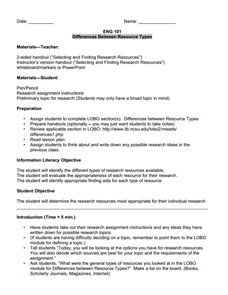Curated OER
Author's Purpose
A simple activity for young readers, this introduces the idea of author purpose. Learners analyze various types of texts (newspaper articles, magazines, books, advertisements, etc.) and determine if the author's purpose for writing was...
Curated OER
Writing Process
Introduce primary graders to the writing process. After reviewing the steps, they practice using the process by writing a book report. Before writing the draft, they complete a graphic organizer. The completed draft is reviewed by peers....
Curated OER
Expressing Money
Students listen to a book read to them by their teacher and express the amount of money stated with their manipulative of play money and show different ways to express that amount of money.
Curated OER
Writing Children's Literature
Young scholars examine the common themes and characteristics of children's literature. They develop a list of characteristics, read and discuss examples of children's literature, and create an original children's book.
Curated OER
Unanswered Questions in Number the Stars
Students read a book, "Number by the Stars." Students explore the internet and search engines. Through guided internet research, students find answers to questions posed in the book. Students share their internet experiences and discuss...
Curated OER
WWI for World History Honors
Using a textbook, learners will examine various aspects related to the Triple Alliance of WWI. They complete a series of handouts, engage in a class discussion, and interpret a map showing both the Triple Alliance and the Triple Entente....
Curated OER
Publication
This lesson was designed in response to a class struggling with Le Petit Prince. The author starts the day by having the class describe (in French) the little prince and his planet. Then, they discuss the use of a dictionary and a list...
Curated OER
Numbers and Counting
Students explore the numbers one through five. Over a three week period, students visit centers in the room to investigate and perform hands-on activities with numbers. They trace numbers, write numbers in shaving cream, count objects,...
Curated OER
Telling Time as an Everyday Use of Numbers
How can we estimate time? Have your young mathematicians make a clock. Then they compare and contrast types of clocks. They practice writing times in two different ways and make a book about telling time.
Curated OER
Ionic bonding
Students explore ionic bonding. They draw examples of ionic bonding and explain the activities of the electrons of the elements. Students use paper plates and candy to draw electron configurations of given atoms.
Curated OER
Everybody Cooks Rice
Students read the book, "Everybody Cooks Rice," and they participate in activities pertaining to the book. They identify countries mentioned in the text and locate them on a world map. They use an atlas to identify the climatic...
Curated OER
Techno Author
Here is a great way to explore language arts by completing a computer activity with classmates. Youngsters read a fairy tale in class and analyze where the beginning, middle and end are. They create their own story using clip art and...
Curated OER
Keyboarding Lesson - R C
Learners engage in a basic lesson in elementary computer keyboarding. They review the home row and the location of letters. Also, they practice conditioning and speed.
Curated OER
Brown Paper Bag Family Memories
Students collect a variety of objects that represent a family memories. The objects are and the variety of family experiences that they represent are shared with their classmates. Speaking, drawing, and writing activities ar4 developed...
Curated OER
Reading Bugs
Review the phonemic sounds of the alphabet letters before examining how to blend letter sounds to make a word. During this teacher-modeled lesson, learners make word bugs out of three phonemes that blend together. As an assessment, read...
San José State University
Adverbs
While designed for college students, this review of adverbs could be used in a high school classroom as well. The worksheet begins with a detailed overview of adverbs which is followed by a six-question activity.
Curated OER
Cyber Bullying
Cyber bullying is an important topic to address with middleschoolers. Here, learners take an active role in identifying and discussing this issue. Reviewing this resource with your class will help to equip them to be a part of the...
Marion County Schools
Popcorn Literacy
Popcorn is a tasty part of a culminating activity designed to motivate readers to share important literary elements. The popcorn fills the inside of a white paper bag that is transformed on the outside into a presentation tool with the...
Curated OER
Differences Between Resource Types
Google it! Like Kleenix, Google has genericized. But when beginning a project, young researchers need to go beyond search engines and become aware of the different types of research resources available. Introduce the options with a...
Curated OER
Italy: The Landscape
Learners work in small groups to create a topographic map of Italy. They must include labeled line drawings of bordering countries and bodies of water. Students use salt and flour clay to make Italy three dimensional, showing the many...
Curated OER
Literature Study Guide: Gulliver's Travels
Although the title suggests this resource is devoted to Gulliver’s Travels, the materials and templates can be used with any work of literature. Readers fill out a reading schedule chart, write a summary, keep a vocabulary word list, and...
Curated OER
Plot of a Short Story (SMART Board)
Help your pupils track the plot of a short story with this SMART Board activity. Using the short story "The Dinner Party" by Mona Gardner (though the lesson would work with any other short story), they define the exposition, rising...
Curated OER
Layers of the Atmosphere Foldable
Aspiring meteorologists make themselves a tool for reviewing the characteristics of each layer of the atmosphere. The procedure for this little project divides the paper into five sections, but many earth science teachers opt for the...
Curated OER
Becoming A Career Detective (Part 2)
Third graders review and expand their discussion of job training and education resources. They work in small groups to find information about the types of training people need to do specific jobs and use data from interviews carried out...





